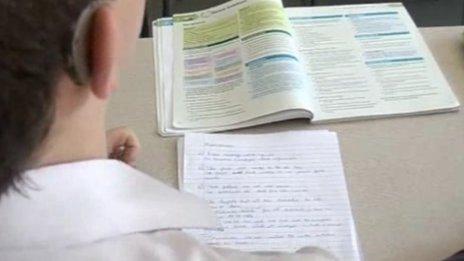Welsh councils cut hearing equipment spending by 15%
- Published

Examples of specially-adapted equipment for people with hearing loss
Spending on specialist equipment for people who have hearing loss has been cut "dramatically" over the past four years, figures have shown.
Figures obtained by Action on Hearing Loss Cymru showed Welsh councils have cut their spending by 15% on average - or £40,000.
The charity said the cuts were "worrying" and called on local authorities to reconsider.
The Welsh Local Government Association (WLGA) blamed council budget cuts.
The money is spent on equipment including specially-adapted telephones, front door bells that flash when used and listening devices for people with hearing loss.
The charity told BBC's Newyddion 9 programme that this equipment allows people to live more independently and reduces isolation and loneliness.
More than 575,000 deaf people live in Wales but just £210,000 is spent annually on specialist equipment each year.

Full-timer carer Chris Williams has two hearing aids
One of those who is worried about the situation is Chris Williams, from Penrhyndeudraeth, Gwynedd, who has been severely deaf from childhood.
"Without hearing aids I can't hear a thing. This equipment is essential," he said.
"I have a special doorbell that lights up, and it works with a phone too. I have a fire alarm that works through bluetooth - which vibrates under my pillow. And with a fire alarm it is a matter of life and death.
"Some people have to buy this sort of equipment on their own. But they cannot afford it even with full-time work."
Richard Williams, the charity's director, said: "More than 70% of people over 70 years old have hearing loss and with an increasing number of people living longer, local authorities are at risk of neglecting those most at risk of isolation and mental health issues."
The charity's research also found there was a postcode lottery on the equipment people with hearing loss can expect to receive.
Richard Williams, director of Action on Hearing Loss Cymru, said the cuts were putting people "at risk"
While some councils having increased spending to meet the rising demand, other authorities have cut expenditure dramatically. Flintshire, Cardiff and Pembrokeshire come bottom of the list.
In response, a WLGA spokesman pointed out that local government funding has been reduced by 18% in real terms since 2009-10.
Council have "had to reduce or stop delivering some local services altogether in order to manage their budgets", the spokesman added.
"Whilst the Welsh Government has committed an extra £25m funding for social services for 2017-18, it will cover just over a quarter of the expected increases in costs and demands facing social services."
- Published15 April 2015

- Published7 May 2013

- Published1 February 2013
